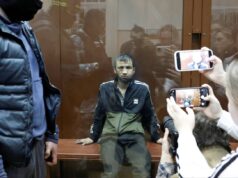Today’s Russia is an “organized crime” state intent on “playing the spoiler” to U.S. interests around the world. So agreed a panel of Russia experts at a Jewish Policy Center luncheon in Washington, D.C. on December 7.
It is important for American policy makers “not to project our own values and thinking” onto the Russian government or Vladimir Putin, said Stephen Blank, Ph.D., a senior fellow at the American Foreign Policy Council. Blank asserted that Russian military leaders see their country “at war with the West.”
In that struggle, Moscow can employ threats, blackmail, military build-ups, and cyberwarfare against an adversary—the United States and its allies—with superior weaponry, communications networks and financial resources. As for Russia’s seriousness, Blank noted that although the country spans 11 times zones (continental United States covers four) it possesses “fewer paved roads than Virginia.” But “the Russian military build-up is continuing,” modernizing both conventional and nuclear forces while the national “safety net is collapsing.”
Panelist Paul Joyal, managing director of law enforcement and public safety practice at National Strategies (NSI), said Putin’s Russia employs organized crime groups based primarily in St. Petersburg to conduct cyberattacks on American and European targets. These organizations also engage in human trafficking, assassinations and other crimes, and serve as a “source of black cash for the government.” In addition, they provide the Kremlin with an element of “deniability” when it comes to violations committed on its behalf, according to Joyal.
He spotlighted the involvement of Putin’s government in the 2006 cyberattack on Estonian communications networks that paralyzed the small Baltic nation by denying it Internet service for 10 days, use by organized crime of cyberwarfare tools years in development to ease Russia’s 2008 military invasion of Georgia, and Moscow’s later attacks on Ukraine’s electrical grid as examples of Russia’s constant hybrid warfare.
Anders Aslund, Ph.D., a senior fellow at the Atlantic Council and economic advisor to the Russian government in the 1990s, described Putin’s government as “a fragile and petrified system,” declaring, “it cannot reform.”
Russia under Putin fields the world’s third largest military, supported by only the world’s 12th largest economy. Because Putin “respects economic constraints,” he “does not start big wars,” said Aslund.
Instead, he seeks “small, victorious wars in the neighborhood” while playing the spoiler to U.S. efforts in the Middle East, Venezuela and beyond, according to Aslund. The Russian leader does not seek to recreate a large Soviet Union but to surround his country with “zones of instability” and protected by “frozen conflicts” which it can simultaneously perpetuate while posing as indispensable mediator. Meanwhile, Russia’s extensive propaganda efforts “present the West as a stagnant failure.”
Panelists concurred that Putin is animated by opportunism, not ideology. For example, when then-President Barack Obama lectured Putin on living in the 19th century while the American leader resided in the 21st, the Russian understood Washington would not intervene militarily in Syria and began bombing in that country three days later.
Aslund charged Putin and his cronies, who with their children control the handful of giant companies that dominate Russia’s economy, send at least $10 billion to $15 billion and perhaps as much as $35 billion to $40 billion annually to overseas accounts. “Massive corruption at the top” siphons the money by way of Cyprus, the United Kingdom, Cayman Islands and United States and launders much of it through real estate purchases and transactions protected by attorney-client relationships at some U.S. law firms.
U.S. leaders should not imagine “a grand bargain” is possible with Putin’s Russia. Instead, panelists recommended Washington “go after the money,” including the $50 billion or more Putin allegedly has stashed abroad.
Recognizing that Russia acts as a relentless adversary and seeks to weaken U.S.-European ties and undermine Western institutions including NATO, panelist said America should strengthen its military, insist that European allies do likewise, and use all elements of national power including economic, diplomatic and military to disrupt Russian networks and intrusions.
For inquiries: Eric Rozenman (202-638-2411)





